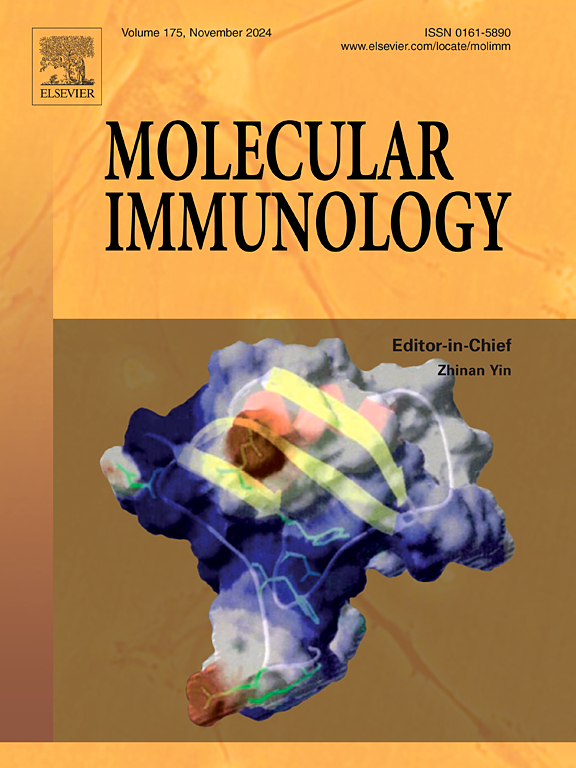细胞因子在有或无合并症的艾滋病毒感染者中对艾滋病毒感染的影响
IF 3
3区 医学
Q2 BIOCHEMISTRY & MOLECULAR BIOLOGY
引用次数: 0
摘要
感染人类免疫缺陷病毒(HIV)会导致免疫系统的恶化。细胞因子水平的变化在HIV感染中可见,并有助于疾病的发病机制。这项研究评估了与HIV感染和合并症相关的细胞因子水平和基因的单核苷酸多态性(SNP)。免疫酶法测定细胞因子(肿瘤坏死因子α (TNF-α)、干扰素γ (IFN-γ)和白细胞介素(IL) 1、6、10和17)的剂量,并采用200种酶(CONT)聚合酶链反应技术对TNF-α SNP - 308 G/A、IFN-γ + 874 T/A、IL-1β - 511 C/T、IL-6 - 174 G/C和IL-10 - 592 C/A进行基因型分析。所有as细胞因子的剂量均观察到相关结果。与CONT相比,PLHIV中TNF-α、IL-1β和IL-10的水平升高,INF-γ、IL-6和IL-17的水平降低,因为SNP表明PLHIV组中高TNF-α产生基因型和低IFN-γ和IL-10产生基因型占主导地位。在PLHIV组中观察到的TNF-α、IFN-γ测试的变化可能与所研究的SNP相关,而SNP IL-10 - 592 C/A似乎表明这种多态性与HIV感染风险相关。因此,研究HIV感染的免疫调节机制可能对建立新的预后生物标志物、发现新的治疗靶点、开发免疫疗法和治愈感染的结果具有重要意义。本文章由计算机程序翻译,如有差异,请以英文原文为准。
The impact of the role of cytokines on HIV infection in people living with HIV with and without comorbidities
Infection with the human immunodeficiency virus (HIV) causes a deterioration of the immune system. Changes in cytokine levels are seen in HIV infection and contribute to the pathogenesis of the disease. This study evaluated cytokine levels and single nucleotide polymorphisms (SNP) of genes associated with HIV infection and the development of comorbidities. The dosage of cytokines [(tumor necrosis factor alpha (TNF-α), interferon gamma (IFN-γ) and interleukins (IL) 1, 6, 10 and 17)] were subjected to immunoenzymatic assays, and genotypes for TNF-α SNP −308 G/A, IFN-γ + 874 T/A, IL-1β −511 C/T, IL-6 −174 G/C and IL-10 −592 C/A by the polymerase chain reaction technique of the 200 enzymes used (CONT) and 200 people living with HIV (PLHIV). Relevant results were observed in the dosage of all as cytokines. There was an increase in the levels of TNF-α, IL-1β and IL-10 and a reduction in the levels of INF-γ, IL-6 and IL-17 in PLHIV compared to CONT. As the SNP demonstrated a predominance of the genotype of high TNF-α producer and low IFN-γ and IL-10 producers in the PLHIV group. Changes in the TNF-α, IFN-γ tests observed in the PLHIV group may be associated with the studied SNP, while the SNP IL-10 −592 C/A seems to indicate an association of this polymorphism with risk of HIV infection. Thus, investigations of the immunoregulatory mechanisms of HIV infection may be important in the establishment of new biomarkers for prognosis, in the discovery of new therapeutic targets, in the development of immunotherapies and in the results for curing the infection.
求助全文
通过发布文献求助,成功后即可免费获取论文全文。
去求助
来源期刊

Molecular immunology
医学-免疫学
CiteScore
6.90
自引率
2.80%
发文量
324
审稿时长
50 days
期刊介绍:
Molecular Immunology publishes original articles, reviews and commentaries on all areas of immunology, with a particular focus on description of cellular, biochemical or genetic mechanisms underlying immunological phenomena. Studies on all model organisms, from invertebrates to humans, are suitable. Examples include, but are not restricted to:
Infection, autoimmunity, transplantation, immunodeficiencies, inflammation and tumor immunology
Mechanisms of induction, regulation and termination of innate and adaptive immunity
Intercellular communication, cooperation and regulation
Intracellular mechanisms of immunity (endocytosis, protein trafficking, pathogen recognition, antigen presentation, etc)
Mechanisms of action of the cells and molecules of the immune system
Structural analysis
Development of the immune system
Comparative immunology and evolution of the immune system
"Omics" studies and bioinformatics
Vaccines, biotechnology and therapeutic manipulation of the immune system (therapeutic antibodies, cytokines, cellular therapies, etc)
Technical developments.
 求助内容:
求助内容: 应助结果提醒方式:
应助结果提醒方式:


